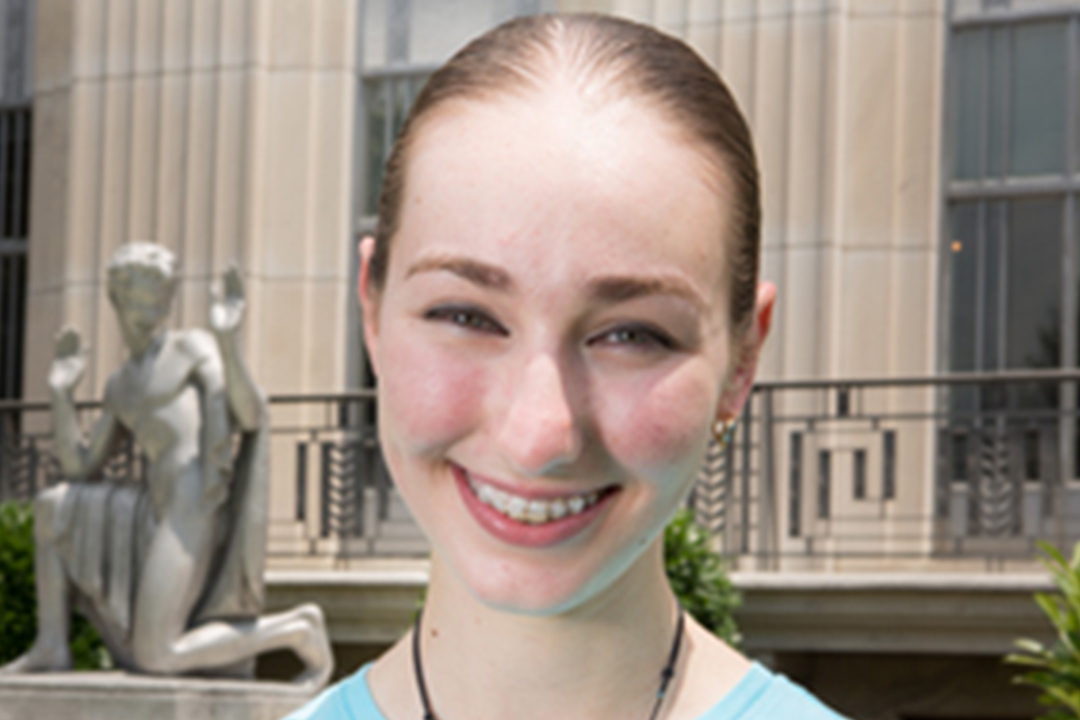Katherine Bradshaw’s Love of the Bard
Forget contemporary authors and playwrights—for Katherine Bradshaw, it’s all about William Shakespeare! The rising sophomore’s enthusiasm is hard to contain, particularly now that she is able to study, eat, breathe, and live the bard’s life through her immersion in the Dean’s Scholars in Shakespeare program, a unique living and learning experience offered to Columbian College undergraduate students. But Bradshaw’s passion began long before college or even high school English class. It all started at the ripe age of seven, when her parents gave her a child’s book retelling Shakespearean plays.
“I fell in love right away,” said Bradshaw, a classics major and English minor. “I begged for more of his books and devoured every ‘Shakespeare for Kids’ work I could find.” She even listened to a full recording of The Tempest repeatedly until she had it memorized. And the complex Shakespearean language was no problem for young Bradshaw; her mind absorbed it at the same time that she was mastering ordinary second grade vocabulary words.
“After the children's versions, I moved to listening to full-length audio dramatizations,” she said. “Since I'm an auditory learner, this helped me to appreciate the beauty and power of the bard's language. In effect, I read Shakespeare with my ears as much as with my eyes.”
While in elementary school, Bradshaw read mostly the comedies, but she branched out to the playwright’s histories and tragedies in middle school and high school. By 10th grade, she had read all 38 of Shakespeare's plays at least once, and studied most of them in-depth. She also enrolled in a Shakespeare class each year in high school.
While in high school, she also took part in summer youth camps with the Shakespeare Theatre Company in Washington, DC, performing in Macbeth, Titus Andronicus, Othello, and Richard III. During the summer prior to her first year at GW, she attended the company's advanced camp, a three-week intensive program that, among other activities, trains students to play one character for an entire show.
Bradshaw’s parents weren’t English teachers or even Shakespeare enthusiasts, but they indulged her passion for his work. When she and her parents researched potential colleges, they discovered the Dean’s Scholars in Shakespeare Program—the only one of its kind in the country—and were immediately drawn to it.
“It is the only one in which your study of Shakespeare begins in your first year, and students are put together in a unit, a body, so they can study together,” she said. “You are immersed in a group who talk about Shakespeare constantly.”
The co-curricular interdisciplinary program exposes students to specially-tailored introductory seminars, guest artists and lecturers, film festivals, performances at Washington, D.C.’s Folger Theatre and the Shakespeare Theatre Company, and faculty-led travel to London and Stratford-upon-Avon. Students are also given special access to the rare collection of Shakespeare materials at the Folger Shakespeare Library in D.C.
Alexander Huang, director of the program and professor of English, has been particularly impressed by Bradshaw and her commitment to her studies. “She has turned out to be quite a wonderful ambassador,” said Huang. “A poster child, if you will, for the program: self-motivated, well-prepared, smart, collegial, and ambitious. She is the kind of student GW should continue to invest in and retain.”
This summer, Bradshaw returned to the Shakespeare Theatre Company as an intern, helping with a program focused on performance learning—a method that teaches students about plays through acting. She worked with actor-trainers to guide middle and high school students on ways to interpret and act out Shakespearean texts. “Even students not intending to be actors got a lot out of it because of the real-life skills they learned, such as being persuasive and empathetic to others,” said Bradshaw.”
Bradshaw also works with grade school students, acting out stories using books by Dr. Seuss or Rudyard Kipling, which often carry Shakespearean themes, or reciting a 10-minute version of The Taming of the Shrew. She enjoys tracing the journey of classical thought through Shakespeare by relating it to modern times. After college, she hopes to continue to share the wonders of the bard’s writings with others.
“Shakespeare is everywhere,” she said. “It’s amazing how his timeless messages transcend language and culture and still impact us today.”


